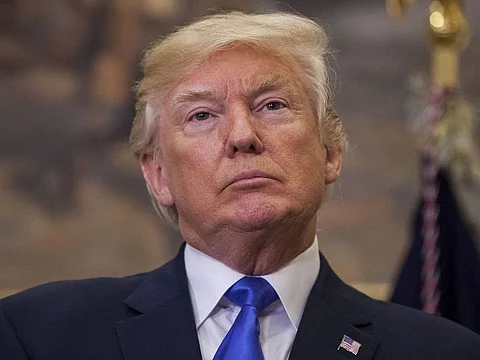THURSDAY, Oct. 26, 2017 (HealthDay News) -- In his first major speech Thursday on the opioid epidemic in the United States, President Donald Trump declared the crisis a public health emergency.
"As Americans, we cannot allow this to continue," Trump said in a speech from the White House. "It is time to liberate our communities from the scourge. We can be the generation that ends the opioid epidemic."
The president, flanked by First Lady Melania Trump and New Jersey Republican Gov. Chris Christie, added that fighting the problem "will require all of our effort, and it will require us to confront the crisis in all of its real complexity."
Christie heads a special presidential commission on controlling the epidemic of opioid addiction.
The president held back from pushing the declaration from a "public" to a "national" state of emergency. A national state of emergency allows states access to money from the federal Disaster Relief Fund, as happens when hurricanes or other natural disasters are declared.
According to the Washington Post, White House officials told reporters that designating the opioid crisis a national state of emergency wasn't appropriate for a longer-term issue and would add little to what can already be done under "public" emergency status.
The emergency status lasts for 90 days but can be renewed repeatedly.
According to the Post, the presidential memorandum that Trump signed Thursday mandates that acting Secretary of Health and Human Services Secretary Eric Hargan direct federal agencies to use their emergency authorities to bring down the number of opioid overdose deaths.
Similar actions have been taken before, the last being in 2009 in response to the H1N1 flu virus.
As the White House explained, under the new measures, new initiatives can be quickly rolled out. For example, people living in remote areas will get easier access to opioid-addiction treatment, and without the need to see a physician in person. States can quickly shift monies from federal grants over to efforts to fight the crisis. And the Department of Health and Human Services will accelerate hiring of personnel who might need to be deployed to various states.
But one major question remains: Where to find the federal funds to cover all these efforts.
As the Post noted, the Public Health Emergency Fund currently has only $57,000 in its coffers. The White House said it is working with Congress to find additional funds, which could run into the tens of billions of dollars. The White House did not issue any cost figures, however.
Cynthia Reilly directs the Substance Use Prevention and Treatment Initiative at the Pew Charitable Trusts. She said "we are pleased to see the Administration take a step to increase awareness about this public health crisis," Reilly said. "Only 1 in 10 Americans with a substance use disorder get any kind of treatment, so expanding access to evidence-based therapies is key. Additional funding and other resources are needed to achieve this goal."
During his campaign for the White House, Trump promised to make fighting addiction a top priority.
But getting the money for effective interventions has been an issue. At a congressional hearing Wednesday, Democrats and Republicans expressed frustration as they grilled Trump administration officials about shortfalls in federal spending to combat the opioid crisis, the Associated Press reported.
"I don't understand why more resources aren't flowing to help out a rural state like West Virginia," said West Virginia Republican Rep. David McKinley.
Added Rep. Ben Ray Lujan, a New Mexico Democrat: "People at home don't feel like they're getting help."
It's been nearly a year since Congress and President Barack Obama approved $1 billion to deal with the opioid crisis. That money is gradually reaching places in need, but there have been setbacks and delays along the way, the AP reported.
"It is a great opportunity, but it comes with a lot of angst," Tom Hill of the nonprofit National Council for Behavioral Health, an addiction treatment provider advocacy group, told the AP.
And in a statement, the American Medical Association said the nation's opioid addiction epidemic remains a tough, moving target.
"The number of prescription opioids in the country is declining while the numbers of people dying from heroin and illicit fentanyl are increasing at a staggering rate," the AMA said. "As it stands, it's easier for patients to access heroin than to access evidence-based treatment and non-opioid pain care. There is plenty of work ahead, and the emergency declaration adds further urgency to this epidemic."
More information
The U.S. National Institute on Drug Abuse has more on opioids.


